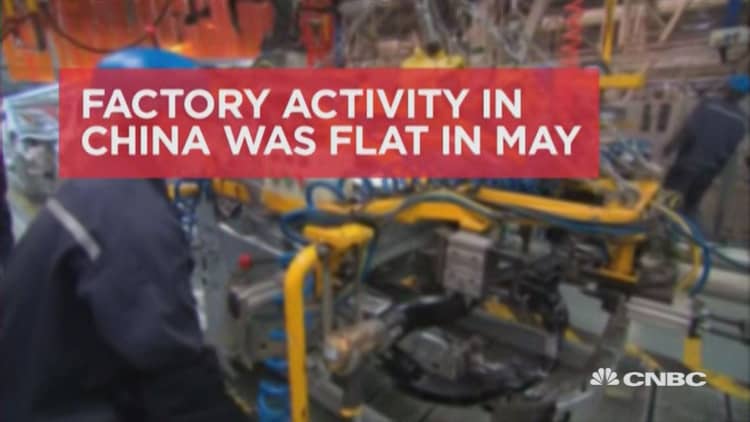
Three separate surveys of Chinese economic activity released Wednesday revived doubts over the durability of the recovery in the world's second-largest economy.
The official May manufacturing Purchasing Managers' Index (PMI) came in at 50.1, Reuters reported. That was unchanged from April and a tick higher than the median 50 reading expected in a Reuters poll of 31 economists. But the report did mark the third straight month of the index hitting the key 50 level.
A reading above 50 indicates expansion in activity while a number below that indicates contraction.
Meanwhile, the Caixin manufacturing PMI index slipped to 49.2 in May, the 15th consecutive month of contraction and a deterioration from April's 49.4 reading. It was the lowest figure since February. Caixin's survey tracks small and medium-sized enterprises instead of the large companies and state-owned enterprises (SOEs) that the official gauge focuses on.
In a separate survey, activity in China's services industry dropped to 53.1 in May, from the previous month's 53.5 reading, Reuters said.
The services sector, which accounts for the bulk of gross domestic product, is crucial to Beijing's economic evolution to consumer-driven growth so declines in the non-manufacturing PMI index may trigger concern over that transformation. This week, the government said it would open up certain services sectors, including finance, education, culture and healthcare, to foreign investment.
Chinese equity markets were mixed following the data, but the Australian dollar—viewed as a proxy for China's growth—spiked as much as up 1 percent against the greenback.
All three reports indicated economic stabilization, but not yet a firm recovery, noted Julia Wang, Greater China economist at HSBC, in a Wednesday note.
"Both monetary and fiscal policies will likely remain in an accommodative mode. Most importantly, the pace of fiscal expansion still holds the key for a sustained recovery in 2016," she said.
Other economists echoed her views.
"Overall, China's economy has not been able to sustain the recovery it had in the first quarter and is in the process of bottoming out. The government still needs to make full use of proactive fiscal policy measures accompanied by a prudent monetary policy to prevent the economy from slowing further," said Zhengsheng Zhong, director of macroeconomic analysis at CEBM Group.
Hopes were high earlier in the year that the economy was on the mend following more than a year's worth of fiscal and monetary support. But data during the past two months have since quashed that optimism, with fixed-asset investment, factory output and retail sales all growing more slowly than expected in April.
"We believe growth momentum in first two months of the second quarter (Q2) may have moderated. As structural reform regained momentum in Q2 with an emphasis to engage in deleverage, de-inventory and de-overcapacity in sectors such as steel and coal this year, we believe monetary policy will remain accommodative supported by a proactive fiscal policy," Citi economists said in a note following Wednesday's data.
Ahead of the three surveys, the China Securities Journal reported that the government was likely to increase fiscal support in the second half of the year.
In a note on Wednesday, analysts at ING said state policy should concentrate on supply side structural reforms instead of demand management policies that influence capital investment and exports. Supply side reforms are micro-economic policies targeted to boost efficiency and productivity, widely seen as crucial to dealing with China's "zombie companies," i.e. debt-saddled firms in operation but nearing bankruptcy.
Last month, an unnamed high-ranking official told The People's Daily, the official Communist Party newspaper, that Beijing must focus on letting zombie companies fail and avoiding monetary easing.


